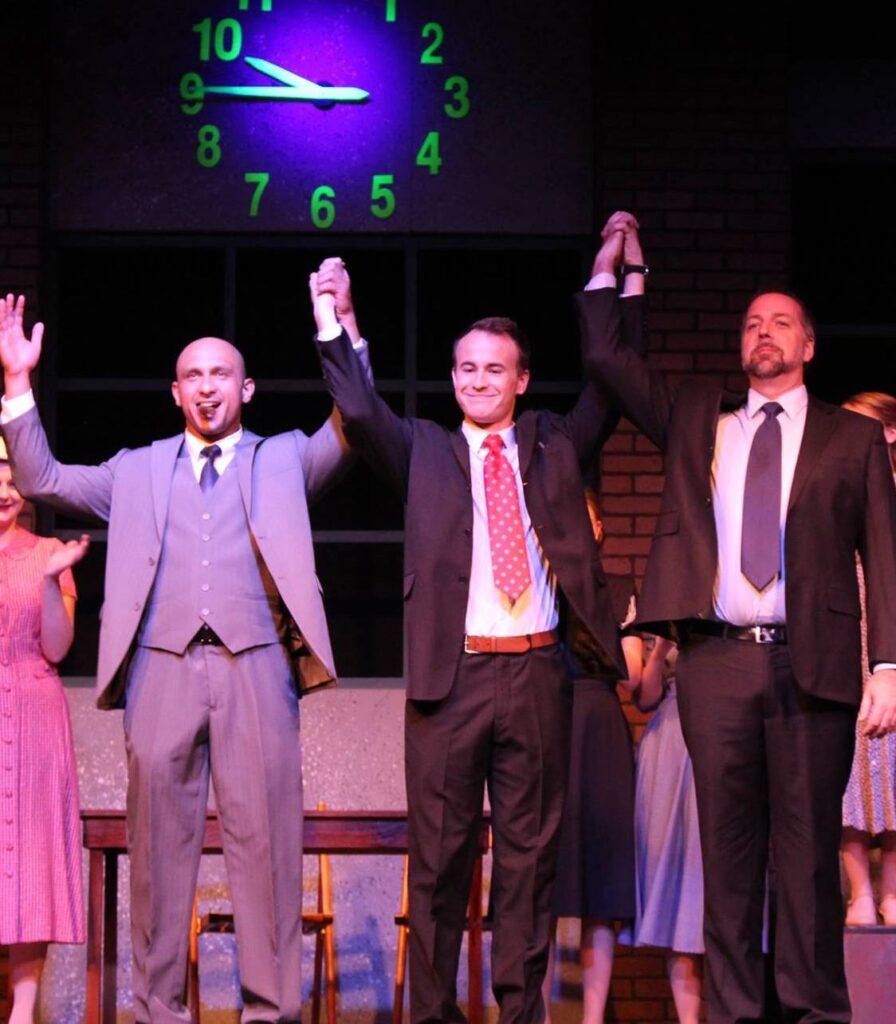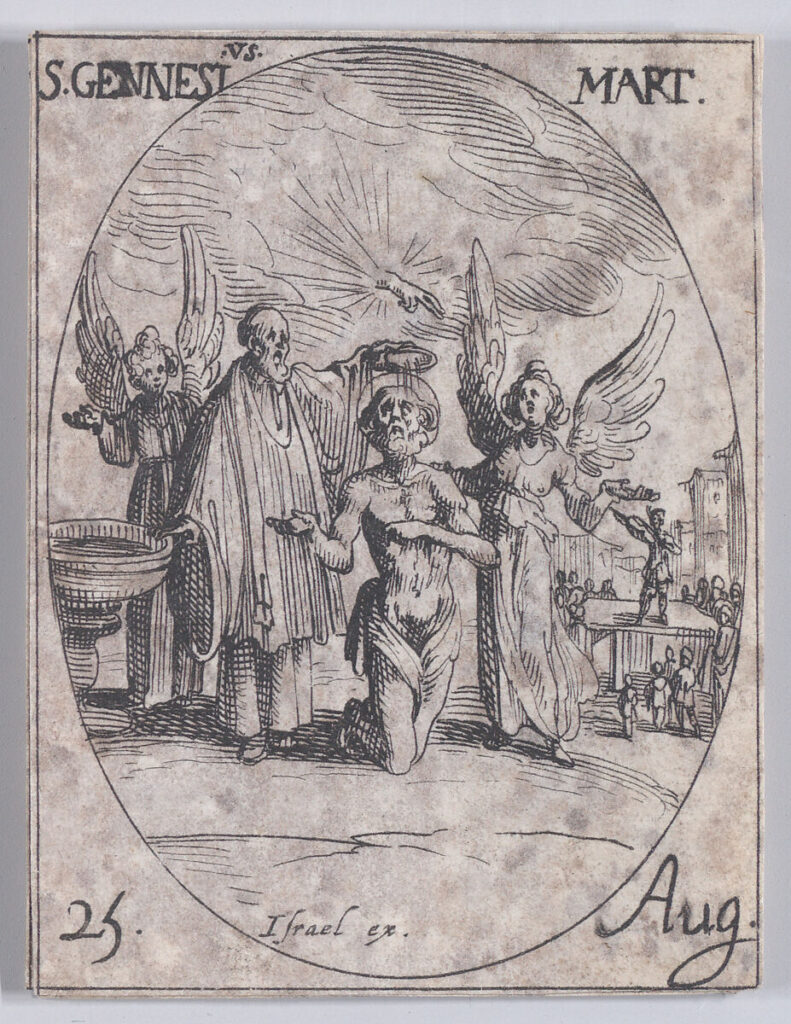Feast Day: August 25
Almost every day after teaching school for a time I found myself standing in a circle with students and our drama director in our “cafetorium” (cafeteria-auditorium). Our theater students would lift up their worries and wishes to each other and to God. At the end, our director would intone, “Saint Genesius, patron saint of actors…” and the group would shout, “Pray for us!”
That community is one of my happiest memories from teaching in a Catholic high school. As a friend of the drama director, I got sucked into helping her program and I have no regrets (despite the occasional tech week evening that stretched until 2am with a 7am start the next morning). Youth theater is a special space; being able to support each other in prayer gave our community an extra depth. Not everyone got along all the time—teenage drama students aren’t going to be able to avoid having some personal dramas—but we normally could work through it and come together again.

The Life and Death of St. Genesius
The life of our patron Genesius certainly had drama, at least in the stories written down several centuries after his death. We know he was one of the many Christians killed by the government in ancient Rome. According to the later stories, he was a playwright and actor. Theater was big business in the Roman Empire that served as both entertainment and social critique. Genesius loved it. He had a biting wit and felt the issues of his day keenly.
When he received an invitation to perform for the Emperor Diocletian, Genesius decided the weird eastern faith that Diocletian was trying to destroy would be an excellent choice for satire. He vaguely knew these Christians worshipped a condemned criminal and had odd rituals that verged on cannibalism, at least in how they talked about them. Mocking Christianity would be low-hanging fruit that would get his theater troupe into the emperor’s good graces.
Genesius, being a responsible writer, started researching his target. He knew he had to understand Christians if he was going to do a decent job of showing how silly they were. Then a funny thing happened. Genesius discovered that lot of what Christians said made sense if one accepted their starting principles. Yet doing so meant questioning the beliefs about power, society, morality, and the existence of the many gods protecting Rome that everyone “knew” to be true. Could what the majority of society believed actually be wrong?
Genesius couldn’t bring himself to take such a radical leap. He stuck with his familiar polytheistic nationalism and went ahead with the play. Soon he found himself standing in front of the emperor and his court. Genesius threw himself with gusto into the role of the main character. As he acted out his satire of a Roman embracing ludicrous Christianity, he felt something stir inside him. As another actor poured water on Genesius’ head in a baptism scene, Genesius recognized God’s grace in his heart. Suddenly he found the fortitude to make that leap of faith that had earlier eluded him. He gave his heart to Christ.
When Genesius interrupted the play to proclaim his new faith in Jesus, the audience initially laughed. Surely this was still part of the play, they thought, and he’s mocking the intense fervor of new converts. Soon, however, the truth became apparent. Genesius was now a Christian and he affirmed that belief in front of an emperor that had ordered the massacre of thousands of Christians. Genesius would now follow these other martyrs to his death.

Genesius, Theater Kids, and Faith
One of the things that rapidly became apparent to me teaching high schoolers was how hard it is as a young adult to break with the pack. That’s one of the things that makes youth theater a special place. This theater culture, where you learn how to act like all different kinds of people, both heroes and villains, becomes a refuge for those who desire the courage to be different than the people around them. Whether practicing how to be different builds that courage or whether putting oneself in the character of someone else teaches theater kids compassion for people who are different, I discovered in youth theater a welcoming space for our students. This was where kids with all the insecurities of being a teenager could open up and learn to be their true selves. For those who bucked their peers’ norms, this space was a lifesaver.
I wish that we all outgrew that pressure to conform to society. We don’t. Jesus told us that his kingdom is not of this world (John 18:36). So long as we are in this world, our faith in Jesus—if lived truly and courageously—will always be countercultural. That’s uncomfortable.
That’s why we have the Church and its sacraments. Only with the help of each other’s prayers and God’s grace can we live as our authentic selves, as God’s beloved children, rejecting the false values and unholy compromises that inevitably infiltrate our secular culture. Evil institutions like slavery once reigned as commonsense realties, something almost all people accepted. Only slowly did some Christians successfully assert that a child of God cannot be reduced to mere property.
What mainstream beliefs today do we not think to challenge? What things do we, as Christians, know to be wrong but go along with because everyone else seems to accept it? Do we have the courage to challenge those injustices? Do we have the courage to support our brothers and sisters trying to break from the norm to live better lives? Saint Genesius, pray for us!
If you have a response, thoughts, or questions, please comment at the bottom of the page. Consider subscribing below to get weekly email notifications about new reflections and other news.



Thanks for another great article and a flashback to when Caitlin and Tayler were stage managers for Radium Girls. Thanks for all you did to help and support the theater program, the students, and the adult team. We were blessed to have you as part of the crew! God Bless!
Brenda
Thank you, Dr Eric, for this story of St Genesius (a saint I had not heard of before), whose conversion was certainly dramatic and, with full knowledge of the consequences, wonderfully courageous.